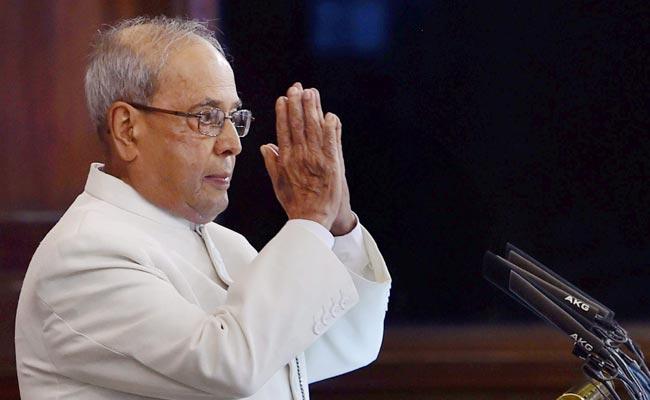
President Pranab Mukherjee, who hands over the country's highest post to Ram Nath Kovind on Tuesday, addressed the nation for the last time this evening. Over the last week, the 81-year-old has attended a series of farewell ceremonies - the last one today was a lunch at the Supreme Court by the Chief Justice of India and the other judges. Yesterday evening, he attended a ceremony in Parliament's Central Hall, where all the lawmakers and Prime Minister Narendra Modi gathered to meet him.
The highlights of President Pranab Mukherjee's tenure:
In his five-year tenure, President Pranab Mukherjee engaged two different governments with equal ease. As the guardian of the constitution, he has acted as an adviser to both governments, ensuring that the decisions made were in keeping with constitutional propriety. When he disagreed, he had spoken his mind without overstepping the constitutional boundaries of his post.
The President has repeatedly drawn the nation's attention to the rising instances of violence, highlighting need to respect the core values of the nation and the democratic institutions. The debate on intolerance last year found resonance in his address on the eve of the Republic Day. "We must guard ourselves against the forces of violence, intolerance and unreason," he had said, adding it was time to take note when "grim instances of violence hit at...established values which are at the core of our nationhood".
Last month, he had expressed concern over instances of mob violence, saying people must remain vigilant against challenges to the fundamental tenets of India's pluralist society. "When mob frenzy becomes so high and irrational, uncontrollable, we are to pause and reflect: are we vigilant enough? I am not talking of vigilantism - I'm talking of are we vigilant enough proactively to save the basic tenets of our country," he said at the launch of a commemorative edition of the Congress-run National Herald newspaper.
In March, the President had weighed in on the debate on free speech and nationalism following the violence at Delhi's Ramjas College, saying there is "no room in India for the intolerant Indian". Students, he said, "must engage in reasoned discussion and debate rather than propagate a culture of unrest".
Last year, President Mukherjee had expressed his reservations after an ordinance, or executive order, was brought to him four times. The ordinance, on the Enemy Property Act, was being repeatedly blocked by the opposition, and was passed for a record five times. President Mukherjee had spoken out repeatedly about ordinances since the Uttarakhand High court quashed the Presidential order imposing Central rule in the state in April 2016. At the time, he had to face criticism from a section of Congress, which alleged that the ordinance had been signed without adequate deliberation.
The President had strongly objected when the ordinance on Enemy Property Act was brought to him once without being routed through the union cabinet, sources said. It was the first time since Independence that an ordinance was sent to the President without clearance from the cabinet. President Mukherjee had said he was signing it for public good, but the occasion should never be taken as a precedent. He subsequently signed another ordinance this month bringing in GST in the state of Jammu and Kashmir without cabinet approval.
The President had also spoken out repeatedly against disruptions to parliamentary proceedings by the opposition, which had washed out several sessions over the last three years. Last year, after the Winter Session of parliament saw repeated adjournments, he had burst out during a speech at a function, telling lawmakers "for God's sake, do your jobs".
In his address to parliament yesterday, President Mukherjee again reminded lawmakers of parliament's duty to legislate through discussion, and not resorting to disruption. Ordinances, or executive orders by the government, should be used only in "compelling circumstances", he said.
In January 2016, President Mukherjee had sent back the controversial Gujarat anti-terror bill with queries - the third president to do so in 15 years. The bill, criticised by activists and the civil society for its potential for misuse, had been passed four times by the Gujarat assembly. Presidents APJ Abdul Kalam and Pratibha Patil had not given it clearance. It was withdrawn by the Home Ministry after President Mukherjee sent it back.
As President, Pranab Mukherjee had also rejected nearly 35 mercy petitions - more than the combined total rejected by his predecessors. When he came into office in July 2012, 10 of these petitions were pending. His predecessor Pratibha Patil had acquired the reputation of being the most lenient President. She had commuted 34 death penalties, rejecting only five petitions.

